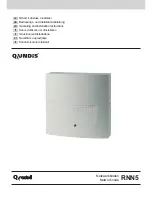
Image: H
2
Mount the sensor and the reflector using suitable mounting brackets (see the SICK
range of accessories). Align the sensor and reflector with each other.
Note the sensor's maximum permissible tightening torque of 0.56 Nm.
3
The sensors must be connected in a voltage-free state (U
v
= 0 V). The information
in the graphics [B] must be observed, depending on the connection type:
–
Male connector connection: pin assignment
–
Cable: core color
Only apply voltage/switch on the power supply (U
v
> 0 V) once all electrical connec‐
tions have been established. The green LED indicator on the top of the sensor
lights up.
Explanations of the connection diagram (Graphic B):
Switching outputs Q and /Q (according to Graphic B):
Switching output Q (according to Graphic B):
HL18-P (PNP: load -> M)
HL18-N (NPN: load -> L+)
L = light switching
D = dark switching
Alarm / Health = diagnostics output (see Additional functions)
4
Align the sensor with a suitable reflector. Select the position so that the red emit‐
ted light beam hits the center of the reflector. Tip: Use the signal strength light bar
on the back of the sensor to help you align it correctly. The sensor must have a
clear view of the reflector, with no object in the path of the beam [see Graphic E/F].
You must ensure that the optical openings of the sensor and reflector are comple‐
tely clear.
Optimized alignment can be achieved and verified by using the signal strength light
bar located on the back cover of the sensor. The LEDs on the light bar will illumina‐
te corresponding to the signal strength of light received by the sensor. When no or
only red LEDs are illuminated, the sensor is receiving no or too little signal to switch
the output. The first yellow LED will illuminate at the minimum switching threshold
and the green LEDs will continue to illuminate as the received light increases [see
Graphic F].
3
COMMISSIONING
2
8017290 | SICK
Subject to change without notice
Technical data and connection diagrams (figure B) starting on page 60.




































